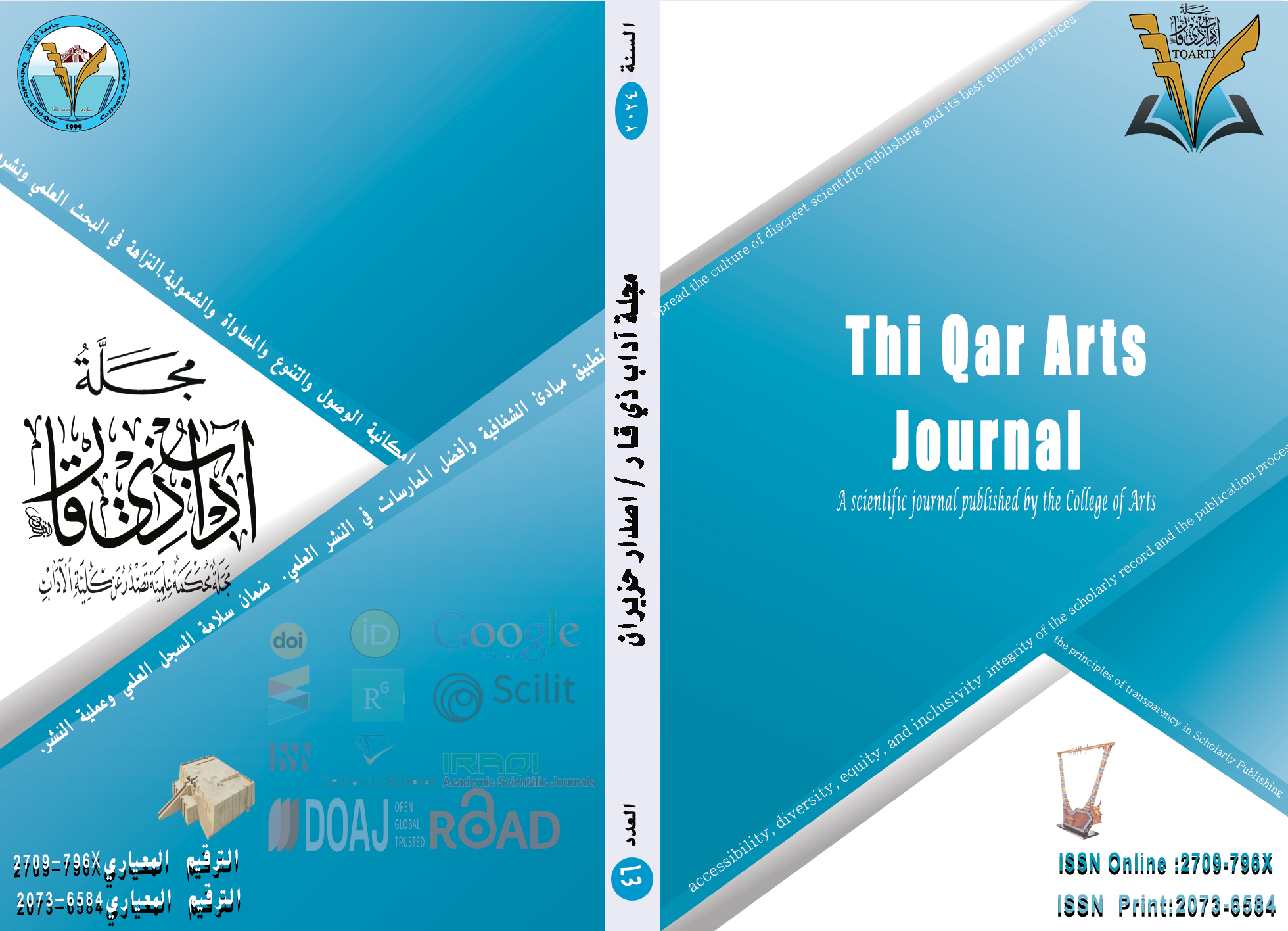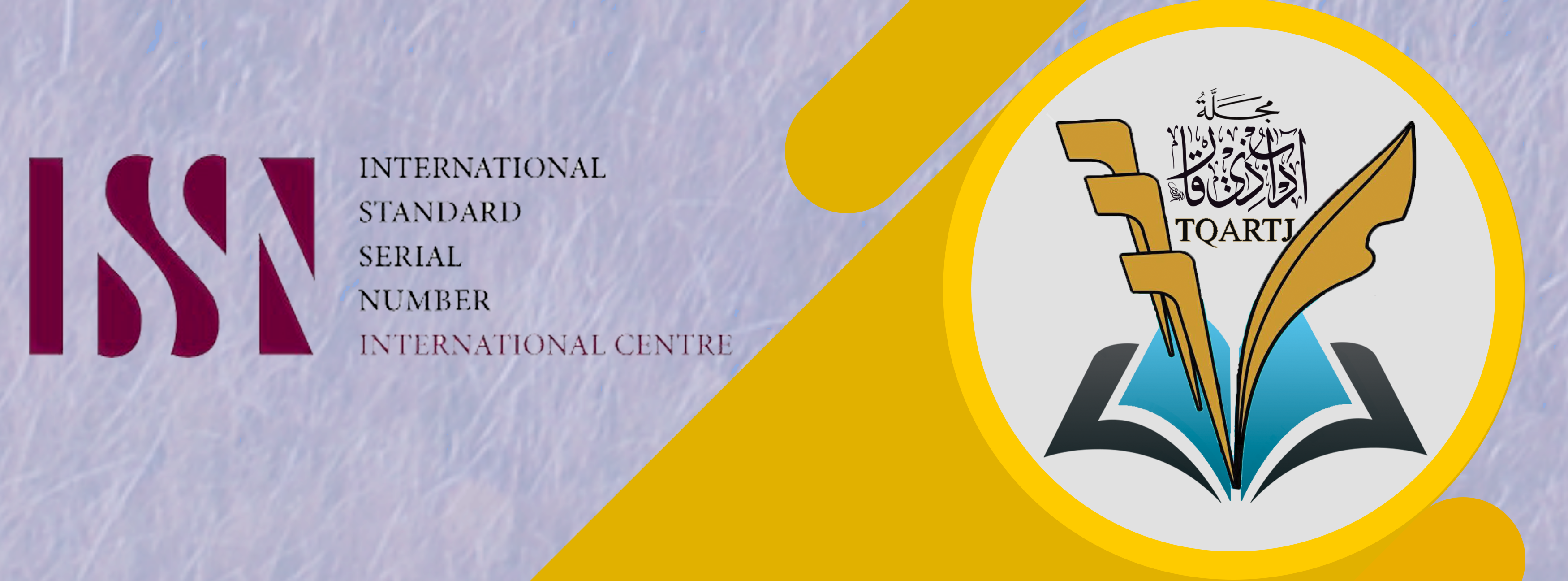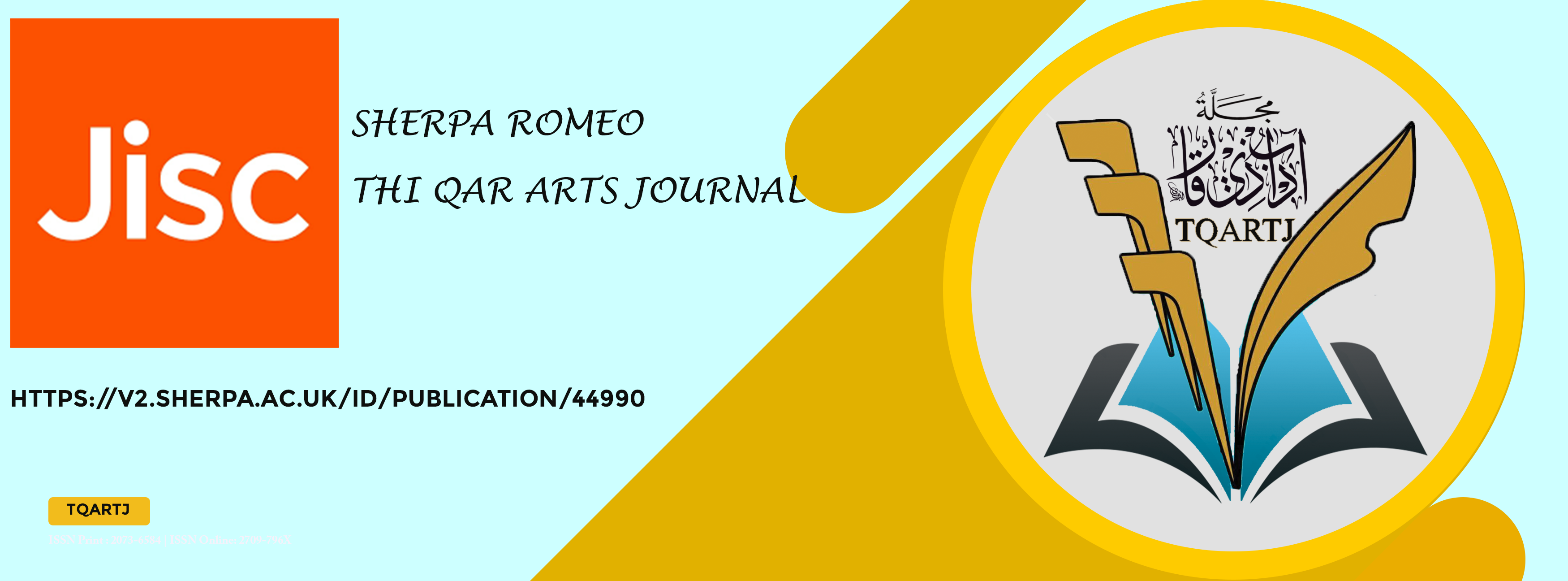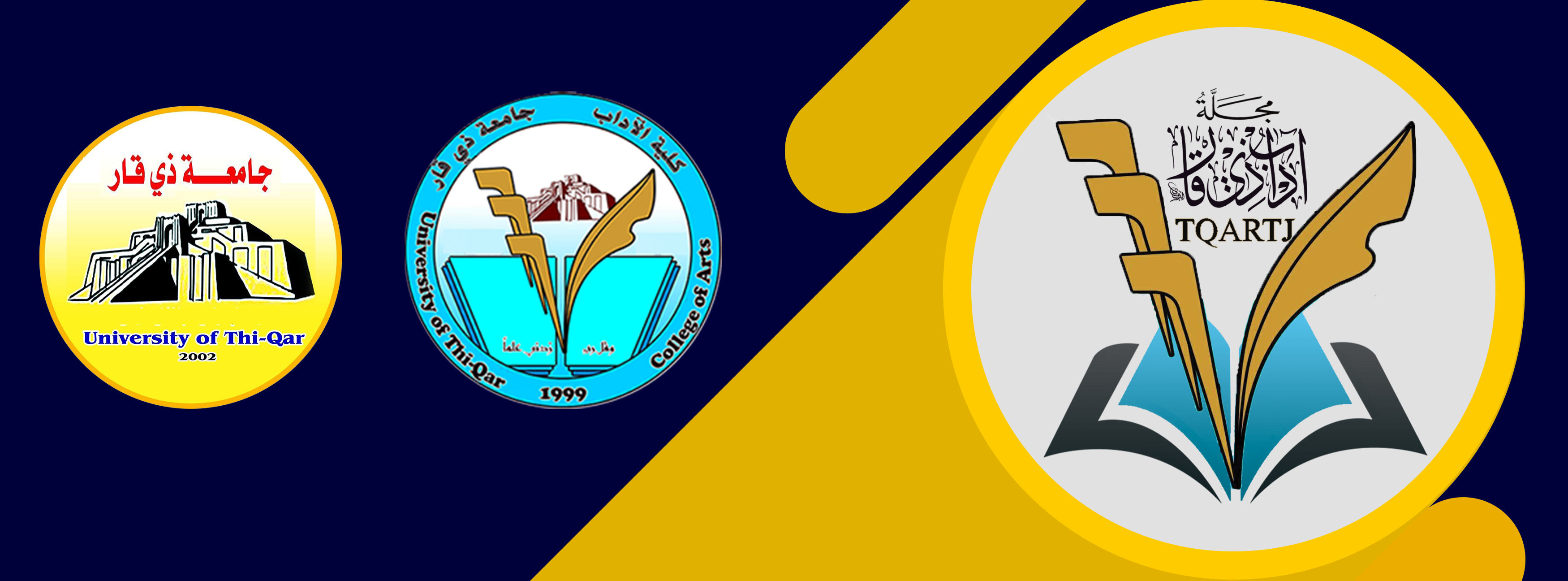Examining the Language of Politics and the Politics of Language via Political Discourse Analysis
DOI:
https://doi.org/10.32792/tqartj.v5i46.632الكلمات المفتاحية:
Language of Politics, Politics of Language, Political Discourse Analysisالملخص
An overview of political discourse analysis (PDA) research is provided in this essay. We start by placing this work in the context of the linguistic and political shifts that occurred in the last half of the twentieth century in the social and human sciences. We next go over many opinions about what constitutes the political and relevant subjects of study for PDA. We examine the connection between PDA and critical discourse analysis (CDA), adopting an inclusive understanding of politics and discourse. We conclude by reviewing political discourse studies in terms of the theoretical and analytical frameworks they use, as well as the sociopolitical topics they tackle.
التنزيلات
المراجع
Achugar, Marianna. 2008. What we remember: the construction of memory in military discourse. Amsterdam: John Benjamins.
Alim, H. Samy, and Angela Reyes. 2011. Complicating race: articulating race across multiple dimensions. Discourse & Society 22(4). 379–84.
Aristotle. 1954. The rhetoric and poetics of Aristotle. Trans. W. Rhys Roberts. New York: Modern Library.
Arkin, William. 2005. Code names: deciphering U.S. military plans, programs and operations in the 9 ⁄ 11 world. Hanover, NH: Steerforth Press.
Bailey, Benjamin. 2000. Communicative behavior and conflict between African-American customers and Korean immigrant retailers in Los Angeles. Discourse & Society 11(1). 86–108.
Becker, Annette. 2007. Between ‘us’ and ‘them’: two TV interviews with German chancellor Gerhard Schroder in the run-up to the Iraq war. Discourse, War, and Terrorism, ed. by Adam Hodges and Chad Nilep, 161–84. Amsterdam: John Benjamins.
Bell, David. 1975. Power, influence, and authority: an essay on political linguistics. New York: Oxford. 1988. Political linguistics and international negotiations. Negotiations Journal, July 4(3). 233–46.
Billig, Michael. 1991. Ideology and opinions: studies in rhetorical psychology. London: Sage.
Bitzer, Loyd. 1981. Political rhetoric. Handbook of political communication, ed. by Dan Nimmo and Keith Sanders, 225–48. Beverly Hills, CA: Sage. 1987. Rhetorical public communication. Critical Studies in Mass Communication 4. 425–8.
Bizzell, Patricia, and Bruce Herzberg. 1990. The rhetorical tradition: readings from classical times to the present. Boston: Bedford.
Black, Edwin. 1965. Rhetorical criticism. New York: MacMillan.
Blackledge, Adrian. 2010. The practice and politics of multilingualism. Perspectives in politics and discourse, ed. By Urszula Okulska and Piotr Cap, 301–26. Amsterdam: John Bejamins.
Blommaert, Jan. 1997. Language and politics, language politics and political linguistics. Belgian Journal of Linguistics 11. 1–10. (ed.) 1999. Language ideological debates. Berlin: Mouton de Gruyter.2001. Investigating narrative inequality: African asylum seekers’ stories in Belgium. Discourse & Society 12(4). 413–49.
Blum-Kulka, Shoshana. 1997. Discourse pragmatics. Discourse as social interaction (Discourse Studies: A Multidisciplinary Introduction Vol. 2), ed. by Teun van Dijk, 38–63. London: Sage.
Bonilla-Silva, Eduardo, and Tyrone A. Forman. 2000. ‘I’m not a racist but…’: mapping white college students’ racial ideology in the USA. Discourse & Society 11(1). 50–85.
Boussofara, Naima. 2011. Bleaching a dialectical voice in political discourse: sociolinguistic choices in re-writing political speeches. Journal of Language and Politics 10(2). 204–26.
Bucholtz, Mary. 2011. ‘It’s different for guys’: gendered narratives of racial conflict among white California youth. Discourse & Society 22(4). 385–402.
Bugarski, Ranko. 2004. Language policies in the successor states of former Yugoslavia. Journal of Language and Politics 3(2). 198–207.
Buttny, Richard, and Princess L. Williams. 2000. Demanding respect: the uses of reported speech in discursive constructions of interracial contact. Discourse & Society 11(1). 109–33.
Caldas-Coulthard, Carmen Rosa, and Malcolm Coulthard. 1996. Texts and practices: readings in critical discourse analysis. London: Routledge.
Cambell, K. K., and K. H. Jamieson. 1990. Deeds done in words: presidential rhetoric and the genres of governance. Chicago: University of Chicago Press.
Cap, Piotr. 2008. Legitimization in political discourse: a cross-disciplinary perspective on the modern U.S. war rhetoric, 2nd edn. New Castle, UK: Cambridge Scholars Press.
Chermak, Steven, Frankie Y. Bailey, and Michelle Brown (eds). 2003. Media representations of September 22. Westport: Praeger.
Chilton, Paul. 1985. Language and the nuclear arms debate: nukespeak today. London: Pinter.
Chouliaraki, Lilie. 2005. Introduction: the soft power of war: legitimacy and community in Iraq war discourses. Journal of Language and Politics 4(1). 1–10.
Chovanec, Jan. 2010. Legitimation through differentiation: discursive construction of Jacques Le Worm Chirac as an opponent to military action. Perspectives in politics and discourse, ed. by Urszula Okulska and Piotr Cap, 61– 82. Amsterdam: John Bejamins.
Chun, Elain. 2011. Reading race beyond black and white. Discourse & Society 22(4). 403–21.
Cienki, Alan J. 2004. Bush’s and Gore’s language and gestures in the 2000 US presidential debates: a test case for two models of metaphors. Journal of Language & Politics 3(3). 409–40.
Collins, John, and Ross Glover. 2002. Collateral language: a user’s guide to America’s new war. New York: New York University Press.
Critical Discourse Studies. 2011. Special issue: ethnography and critical discourse analysis: toward a problem-oriented research dialogue 8(4). 231–309.
Dallmayr, Fred. 1984. Language and politics: why does language matter to political philosophy. London: University of Notre Dame.
Davies, Alan. 1994. Politicized language. The encyclopedia of language and linguistics (vol. 6), ed. by Ron E. Asher, 3211–4. Oxford: Pergamon.
Del-Teso-Craviotto, Marisol. 2009. Racism and xenophobia in immigrants’ discourse: the case of Argentines in Spain. Discourse & Society 20(5). 571–92.
van Dijk, Teun. 1987. Communicating racism: ethnic prejudice in thought and talk. Newbury Park, CA: Sage.
Dunmire, Patricia L. 2009. ‘9 ⁄ 11 changed everything’: an intertextual analysis of the Bush Doctrine. Discourse & Society 20(2). 195–222.
Edelman, Murray. 1964. The symbolic uses of politics. Urbana: University of Illinois Press.
Edwards, John. 2004. After the fall. Discourse & Society 15(2-3). 155–84.
Ekstrom, Mats. 2009. Power and affiliation in presidential press conferences: a study on interruptions, jokes, and laughter. Journal of Language and Politics 8(3). 386–415.
Fairclough, Norman. 1985. Critical and descriptive goals in discourse analysis. Journal of Pragmatics 9. 739–63.
Ferrari, Federica. 2007. Metaphor at work in the analysis of political discourse: investigating a ‘preventive war’
persuasion strategy. Discourse & Society 18(5). 603–25.
Fowler, Roger. 1987. Notes on critical linguistics. Language topics: essays in honor of M.A.K. Halliday, ed. by
Ross Steele and Terry Threadgold, 481–92. Amsterdam: John Benjamins.
Gastil, John. 1992. Undemocratic discourse: a review of theory and research on political discourse. Discourse & Society 3(4). 469–500.
Geis, Michael. 1987. The language of politics. New York: Springer-Verlag. Goodman, Simon, and Susan A. Speer. 2007. Category use in the construction of asylum seekers. Critical Discourse Studies 4(2). 165–85.
Graber, Doris. 1976. Verbal behahavior and politics. Urbana, IL: University of Illinois Press.
Graham, Phil, Thomas Keenan, and Anne-Marie Dowd. 2004. A call to arms at the end of history: a discoursehistorical analysis of George W. Bush’s declaration of war on terror. Discourse & Society 15(2-3). 199–221.
Hall, Stuart. 1982. The rediscovery of ‘ideology’: return of the repressed in media studies. Culture, society, and the media, ed. by Michael Gurevitch, Tony Bennett, James Curran and Janet Woolacott, 56–90. London: Methuen.
Halliday, Michael. 1978. Language as social semiotic. London: Edward Arnold.
Harris, Sandra, Karen Grainger, and Louise Mullany. 2006. The pragmatics of political apologies. Discourse & Society 17(6). 715–37.
Hart, Roderick P. 1984. Verbal style and the presidency. Orlando, FL: Academic Press.
Heer, Hannes, Walter Manoschek, Alexander Pollak, and Ruth Wodak (eds). 2008. The discursive construction of history: remembering the Wehrmacht’s War of Annihilation. Houndmills: Palgrave Macmillan.
Hodges, Adam. 2011. The war on terror narrative. Oxford: Oxford University Press.
Hudson, Kenneth. 1978. The language of modern politics. London: MacMillan.
Jamieson, Kathleen H. 1988. Eloquence in the electronic age. New York: Oxford University Press.
Jarana, Enrique, Hank Johnston, and Joseph R. Gusfield. 1994. New social movements: from ideology to identity. Philadelphia: Temple University Press.
Joseph, John (ed.) 2010. Language and politics (vol. IV). New York: Routledge.
Journal of Language & Politics. 2005. Special issue: the soft power of war 4(1). 1–168.
Kellner, Douglas. 2004. 9 ⁄ 11, spectacles of terror, and media manipulation. Critical Discourse Studies 1(1). 41–64.
Kress, Gunther. 1983. Linguistic and ideological transformation in news reporting. Language, image, media, ed. By Howard Davis and Paul Walton, 120–38. New York: St. Martins.
Kroskrity, Paul V. 1992. Arizona Kiva speech as a manifestation of linguistic ideology. Pragmatics 2(3). 297–309.
Lakoff, George. 2001. The power of images. Metaphorik.de. http://www.metaphorik.de/aufsaetze/lakoff-september11.
Lazar, Annita, and Michelle Lazar. 2007. Enforcing justice, justifying force: America’s justification of violence in the New World Order. Discourse, war, and terrorism, ed. by Adam Hodges and Chad Nilep, 45–63. Amsterdam: John Benjamins.
van Leeuwen, Theo. 1993. Genre and field in critical discourse analysis: a synopsis. Discourse & Society 4(2). 193– 225.
Lemke, Jay. 1995. Textual politics: discourse and social dynamics. London: Taylor Francis.
Lemons, Katherine. 2007. Discourses of freedom: gender and religion in US media coverage of the war on Iraq.
Discourse, war, and terrorism, ed. by Adam Hodges and Chad Nilep, 89–104. Amsterdam: John Benjamins.
Luke, Allan. 2002. Beyond science and ideology critique: developments in critical discourse analysis. Annual Review of Applied Linguistics 22. 96–110.
Lule, Jack. 2004. War and its metaphors: news language and the prelude to war in Iraq, 2003. Journalism Studies 5(2). 179–90.
Machin, David, and Theo van Leeuwen. 2005. Computer games as political discourse: the case of Black Hawk Down. The Journal of Language and Politics 4(1). 119–41.
Martin-Rojo, Luisa, and Teun van Dijk. 1997. ‘There was a problem, and it was solved’: legitimating the expulsion of ‘illegal’ migrants in Spanish parliamentary discourse. Discourse & Society 8(4). 523–66.
Mazid, Bahaa-eddin M. 2007. Presuppositions and strategic functions in Bush’s 20 ⁄ 9 ⁄ 2001 speech: a critical discourse analysis. Journal of Language and Politics 6(3). 351–75.
McKenna, Bernard. 2004. Critial discourse studies: where to from here? Critical Discourse Studies 1(1). 9–39.
McLeod, James. 1999. The sociodrama of presidential politics: rhetoric, ritual, and power in the era of teledemocracy. American Anthropologist 101(2). 359–73.
Miller, Gerald R., and Herbert W. Simons. 1974. Perspectives on communication in social conflict. Englewood Cliffs, NJ: Prentice-Hall.
Morris III, C. E., and Stephen Browne. 2001. Readings on the rhetoric of social protest. State College, PA: Strata Publishing.
Muntigl, Peter. 2002. Politicization and depoliticization: unemployment policy in the European Union. Politics as text and talk: analytic approaches to political discourse, ed. by Paul Chilton and Christine Schaffner, 45–79. Amsterdam: John Benjamins.
Myers, Greg. 2010. Stance-taking and public discussions in blogs. Critical Discourse Studies 7(4). 263–75. Oddo, John. 2011. War legitimation: representing ‘us’ and ‘them’ in four presidential addresses. Discourse & Society 22(3). 1–28.
O’Halloran, Kieran A. 2003. Critical discourse analysis and language cognition. Edinburgh: Edinburg University Press.
Okulska, Urszula, and Piotr Cap. 2010. Analysis of political discourse: landmarks, challenges, and prospects. Perspectives in politics and discourse, ed. by Urszula Okulska and Piotr Cap’s, 3–22. Amsterdam: John Bejamins.
Peled, Yael. 2011. Language, rights and the language of language rights: the need for a new conceptual framework in the political theory of language policy. Journal of Language & Politics 10(3). 436–56.
Pelinka, Anton. 2007. Language as a political category: the viewpoint of political science. Journal of Language & Politics 6(1). 129–43.
Pfaff, Carol W. 2010. Multilingual development in Germany in the crossfire of ideology and politics. Perspectives in politics and discourse, ed. by Urszula Okulska and Piotr Cap, 327–58. Amsterdam: John Bejamins.
Schegloff, Emmanuel. 1997. Whose text? Whose context? Discourse & Society 8(2). 165–87.
Schiffrin, Deborah. 2001. Language and public memorial: ‘America’s concentration camps.’ Discourse & Society 12(4). 505–34.
Seidel, Gil. 1985. Political discoures analysis. Handbook of discourse analysis: discourse analysis in society, ed. By Teunvan Dijk, 43–60. London: Academic Press.
Shapiro, Michael. 1981. Language and political understanding: the politics of discursive practices. New Haven: Yale University Press.
Silberstein, Sandra. 2002. War of words: language, politics, and 9 ⁄ 11. London: Routledge.
Silverstein, Michael. 1979. Language structure and linguistic ideology. The elements: a parasession on linguistic units and levels, ed. by Paul R. Clyne, William F. Hanks and Carol L. Hofbauer, 193–247. Chicago: Chicago Linguistic Society.
Skinner, Daniel, and Rosa Squillacote. 2010. New bodies: beyond illness, dirt, vermin and other metaphors of terror.
Perspectives in politics and discourse, ed. by Urszula Okulska and Piotr Cap, 43–60. Amsterdam: John Bejamins.
Slembrouck, Stef. 2001. Explanation, intepretation and critique in the analysis of discourse. Critique of Anthropology 21. 33–57.
Stoltz, Gergory Ian. 2007. Arabs in the morning paper: a case of shifting identity. Discourse, war, and terrorism, ed. by Adam Hodges and Chad Nilep, 105–22. Amsterdam: John Benjamins.
Teo, Peter. 2000. Racism in the news: a critical discourse analysis of news reporting in two Australian newspaper. Discourse & Society 11(1). 7–49.
Titscher, Stefan, Michael Meyer, Ruth Wodak, and Eva Vetter. 2000. Methods of text and discourse analysis. London: Sage.
Verschueren, Jef. 2001. Predicaments of criticism. Critique of Anthropology 21. 59–81. Vickers, Brian. 1988. Indefense of rhetoric. Oxford: Clarendon Press.
Weiss, Gilbert, and Ruth Wodak. 2003. Critical discourse analysis: theory and interdisciplinarity. Basingstoke: Palgrave Macmillan.
West, Candace, and Sarah Fenstermaker. 2002. Accountability in action: the accomplishment of gender, race and class in a meeting of the University of California Board of Regents. Discourse & Society 13(4). 537–63.
Wetherall, Margaret. 1998. Positioning and interpretative repertoires: conversation analysis and post-structuralism in dialogue. Discourse & Society 9(3). 387–412.
Widdowson, Henry G. 1995. Discourse analysis: a critical view. Language and Literature 4. 157–72.
Wilson, John. 1990. Politically speaking: pragmatic analysis of political language. Oxford: Basil Blackwell.
Windt, Theodore. 1983. Presidential rhetoric: 1961 to the present. Dubuque: Kendall ⁄ Hunt.
Wodak, Ruth (ed.) 1989. Language, power, and ideology: studies in political discourse. Amsterdam: John Benjamins. Jan-Ola Ostman, Jan Blommeart and Chris Bulcean, 205–10. Amsterdam: John Benjamins.
Woolard, Kathryn A. 1992. Language ideology: issues and approaches. Pragmatics 2(3). 235–49.
Young, Lynn, and Claire Harrison. 2004. Systemic functional linguistics and critical discourse analysis. London: Continuum.
Zarefsky, David. 2004. Presidential rhetoric and the power of definition. Presidential Studies Quarterly 34(3). 607– 19.
التنزيلات
منشور
كيفية الاقتباس
الرخصة
الحقوق الفكرية (c) 2024 Dorgham Ahmed Nafea، Aboothar Ali Taher

هذا العمل مرخص بموجب Creative Commons Attribution 4.0 International License.
تطبق المجلة رخصة المشاع الابداعي (a Creative Commons Attribution 4.0 International) . تسمح هذه الرخصة للمؤلفين بالاحتفاظ بحقوق النشر لأوراقهم. ولكن هذه الرخصة تسمح لأي مستخدم بتحميل، طباعة، استخراج، إعادة استخدام، أرشفة، وتوزيع المقال، طالما يتم إعطاء الائتمان المناسب للمؤلفين ومصدر العمل. تضمن الرخصة أن يكون المقال متاحًا على نطاق واسع قدر الإمكان وتضمين المقال في أي أرشيف علمي.














